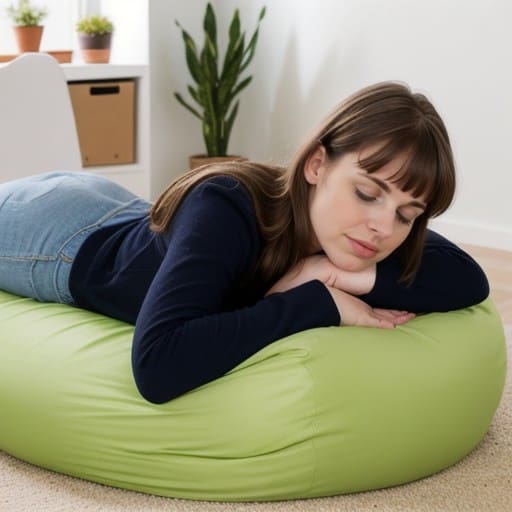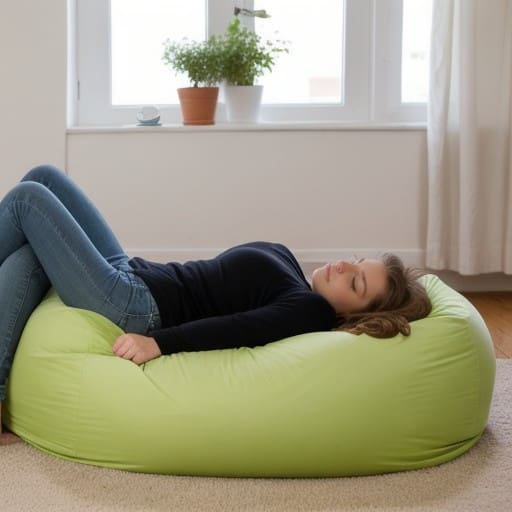Bean bags are a popular piece of furniture for relaxation and comfort. They’re soft, squishy, and can be molded into any shape. But is sleeping on a bean bag bad for your back?
The answer can be a yes or no based on several factors that can affect whether or not sleeping on a bean bag is bad for your back. These points include the type of bean bag, the way you sleep, and your body shape and size.
In this article, I’ll explore the pros and cons of sleeping on a bean bag. I’ll also discuss the factors that affect whether or not sleeping on a bean bag is unsafe for your back. Finally, I’ll give you some tips for sleeping on a bean bag without waking up with muscle pain.
Sleeping on bean bags does a wonderful job of improving circulation, reducing back pain, increasing comfort, and more. That is, of course, if you sleep in proper posture and follow some guidelines that we’ll mention later.
Let’s take a closer look at each positive point in more detail!
When you sleep on a firm surface, your body weight can compress your blood vessels, restricting blood flow to a certain degree. This restriction can lead to stiffness, pain, and fatigue.
However, when you sleep on a bean bag, the beans move around to accommodate your body. As a result, this posture keeps your blood vessels open and allows for better circulation.
Bean bags can also help reduce back pain because they support your back in a way that a firm surface can’t.
In the second scenario, your spine may become misaligned because it needs to rest against a curved surface that hugs its natural shape.
On the other hand, a bean bag conforms to the shape of your spine, which reduces the chances of discomfort and soreness in your back from sleep.
Related: Does Sleeping on Your Back Flatten Your Butt?
More practically, bean bags stand out because they’re versatile pieces of furniture, not just because they’re sleeping surfaces.
They can double as chairs, beds, or even couches, which makes them a great option for people with limited space. Additionally, bean bags are highly portable, so you can easily takeyours from one room to another without hurting your back in the process!

Now, let’s get to the cons of sleeping on a bean bag, shall we?
One of the biggest disadvantages of sleeping on a bean bag is that it usually lacks the level of support that a bed gives you.
The longer you twist and turn on your bean bag, the more often the beans will shift around, which can leave you with poor posture. This is how you may unintentionally end up with back pain, neck pain, and other problems.
Another downside of napping on a bean bag is that the beans might make it hard to roll over or push yourself up.
If you already have difficulty getting out of bed in the morning, a bean bag may not be the best sleeping surface for you. It could still be a good option for an occasional nap, but it might end up being a two-hour slumber if you’re not careful!
Unfortunately, bean bags don’t feel comfortable with every sleeping position.
If you’re a side sleeper, you might find that a bean bag isn’t supportive enough of your favorite way to lie down. Plus, people who sleep with their arms or legs bent could face trouble with the beans digging into their skin.
Here are some other drawbacks of sleeping on a bean bag worth mentioning:
If you’re considering sleeping on a bean bag, it’s important to be aware of the following factors to get the real picture.
The type of bean bag you choose can affect whether or not it’s bad for your back.
For example, bean bags that contain small beans shift around more freely, which can cause spine misalignment. On the contrary, those with large beans do a better job of staying in place, promising more support for your back.
In addition, you should think about the size of the bean bag you intend to sleep on. A too-small bag may lack comfort, while a too-large bean bag won’t be able to support your weight evenly.
In both scenarios, the chances of ending up with back pain will be quite high! That’s why it’s best to aim for a diameter of seven feet to keep these odds low.
A bean bag that’s too rigid can put too much pressure on your spine, while a too-soft bean bag chair won’t be able to provide enough support. If you are prone to sleeping on your side, this could even cause hip pain.
The ideal bean bag for your back will be firm enough to keep your body in the proper position but soft enough to conform to your body shape.
Your sleeping position can also affect whether or not sleeping on a bean bag is harmful to your back.
For instance, if you sleep on your sides, the beans in a bean bag may put additional pressure on your spine and neck, causing pain and discomfort.
On the other hand, the beans may be able to provide more support for your spine if you’re a back sleeper. Talk about less pain and improved sleep quality!
One important factor that can make or break your bean bag sleeping experience is its weight tolerance. If it’s too low, it won’t be able to provide optimum support and will leave you with poor posture.
A good rule of thumb is that if you weigh 200 pounds, you should look for a bean bag with a weight tolerance of at least 250 pounds. The same applies if you weigh more or less.
If you have any medical conditions, such as back pain or arthritis, talk to your doctor before sleeping on a bean bag.
Sleeping on a bean bag can aggravate your condition if you’re not careful.
Here are a few things you can do to reduce your risk of back pain if you’re ready to nap on your cozy bean bag chair:

While bean bags aren’t a big no-no in general, they may not be the best sleeping surface for everyone. Here are some people who may want to avoid sleeping on a bean bag:
Readers Also Check: Manta Sleep Mask Review: Is It Truly Good as Everybody Says?
For some people, sleeping on a bean bag can provide adequate support and relieve back pain. Yet, for others, it can lead to poor posture and an aching back.
Whether or not sleeping on a bean bag is bad for your back depends on some factors. These points include your body size and weight, the size of the bean bag, your sleeping position, and more.
If you’re considering sleeping on a bean bag, experiment with different positions and types of bean bags to find what works best for you.
Finally, talk to your doctor If you have any concerns about sleeping on a bean bag.